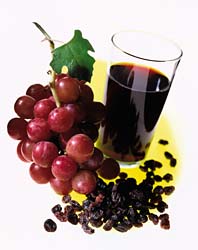Home » Curiosity Corner: A touch of the grape may be good for the heart
Curiosity Corner: A touch of the grape may be good for the heart
August 3, 2008
A touch of the grape may be good for the heart
Question: I heard on the news that grape juice may help prevent heart attacks. How is this? (Asked by a curious column reader.)
Reply: What’s good and bad for you seems to change every day, and it is easy to get lost and/or confused.  First of all, let’s talk about blood cells. Most people know there are white and red blood cells. But there is a third type called platelets. Platelets are involved in the first stage of the blood clotting process. When a blood vessel is injured (and you bleed), platelets gather there and provide a sticky substance that “glues” the cells together. Other chemicals in the blood then assist in forming a clot that seals the wound.
First of all, let’s talk about blood cells. Most people know there are white and red blood cells. But there is a third type called platelets. Platelets are involved in the first stage of the blood clotting process. When a blood vessel is injured (and you bleed), platelets gather there and provide a sticky substance that “glues” the cells together. Other chemicals in the blood then assist in forming a clot that seals the wound.
Clotting is not always good, in the sense that heart attacks can occur when blood clots stick to fatty deposits on the walls of the arteries, blocking the flow of blood. You may have read that aspirin and red wines tend to reduce the platelets’ activity to clot, thereby reducing the possibility of heart attack. Natural substances called flavonoids found in various foods appear to have the ability to reduce platelet clotting. Red wines and grape juice contain flavonoids.
In recent studies on humans and monkeys, it was found that drinking purple grape juice reduced the platelet activity by as much as  75 percent, as compared to 45 percent for aspirin and red wine. It is hoped that a drug can be manufactured from grapes that could be used in heart attack treatment. However, always remember to consult with your physician on such things. Blood clotting is very essential and slowing down platelet activity could lead to unwanted bleeding.
75 percent, as compared to 45 percent for aspirin and red wine. It is hoped that a drug can be manufactured from grapes that could be used in heart attack treatment. However, always remember to consult with your physician on such things. Blood clotting is very essential and slowing down platelet activity could lead to unwanted bleeding.
C.P.S. (Curious Postscript) I like red wine because it’s more sophisticated, more complex and mature. It’s a bit like me, no longer young but not old yet either. -Mick Hucknall
Curious about something? Send your questions to Dr. Jerry D. Wilson, Science Division, Lander University, Greenwood, SC, 29649, or for e-mail, www.curiosity-corner.net. Selected questions will appear in the Curiosity Corner. © JDW
See HERE for last week’s Curiosity Corner.
Curious about something? Send your questions to Dr. Jerry D. Wilson, Science Division, Lander University, Greenwood, SC, 29649, or for e-mail, jerry@curiosity-corner.net. Selected questions will appear in the Curiosity Corner. © JDW


















Drinking red wine for the intake of resveratrol is not the best way to reduce cancer. You should drink wine because you like it. You should find a supplement company that provides resveratrol to supplement your diet.